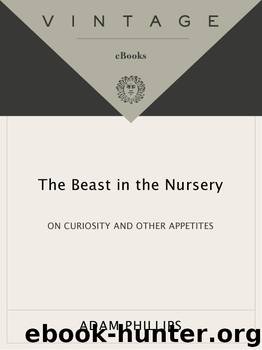The Beast in the Nursery by Adam Phillips

Author:Adam Phillips [Phillips, Adam]
Language: eng
Format: epub
ISBN: 978-0-307-77275-6
Publisher: Knopf Doubleday Publishing Group
Published: 2010-12-14T16:00:00+00:00
This is a letter, one could say, about how little one might need; about what we can learn from insects about how to live (spiders are exemplary, bees are not); about indolence and invention and, of course, about how to read (given a chance, less can be more).
In this great letter Keats—whose life was trammeled by struggle but who was keen to be tenacious—is speaking up for, and talking himself into, the virtue of not being conventionally thorough: he is writing as a poet, not as a scholar. His letter is a small manifesto against conscientiousness; in favor of what psychoanalysts might call dreamwork and Keats calls, more winningly, diligent indolence. Because he is for growth, he asserts, he is against effort (the letter is rife with images of eating, pollination, and generation). It is a celebration of affinities—the noble insect that happens to be drawn to the flower—but not of forced relations. What you don’t feel like doing, you don’t feel like: to be avid with purpose—like the bee “buzzing here and there impatiently from a knowledge of what is to be arrived at”—is a distraction.
Of course, Keats is feeling guilty and needs permission for this hymn to intelligent laziness: “I have not read any Books—the Morning said I was right.” There may be guilt about not working, and there may also be guilt about the pleasure of not working. Just as usury was once condemned because it seemed to be a way of earning money without actually working, so the pleasure of dreamwork—a night sleeping, or a day drifting—can seem illicit, a kind of unearned work. We don’t always know when we are working or, indeed, what working is. Our ends are often incommensurate with our means.
What Keats is at his most leisured pains to say in this letter is how much can be made of what is apparently so little. You don’t have to do very much to get things done as long as you don’t need to know what you are doing. If you have too much of a plan, you’ve got a real job on your hands. Only “a certain Page of full Poesy or distilled Prose” need be mulled over in “delicious diligent Indolence” (it’s the difference, say, between reading a book for the sentences and reading it for the plot). “The points of leaves and twigs on which the Spider begins her work are few,” and yet from these few points—a not unincidental word—she builds her “own airy Citadel.” We need not be busy with intentions, harassed by our aims, but rather, he suggests, “passive and receptive—budding patiently under the eye of Apollo and taking hints from every noble insect that favors us with a visit.” This is why it is better to be a flower than a bee; a flower can take a hint. For Keats, inspiration means being able to take the hint.
Keats’s letter does what it describes; it even does what Keats wanted it to do for Reynolds: “It is
Download
This site does not store any files on its server. We only index and link to content provided by other sites. Please contact the content providers to delete copyright contents if any and email us, we'll remove relevant links or contents immediately.
Rewire Your Anxious Brain by Catherine M. Pittman(17608)
Talking to Strangers by Malcolm Gladwell(11927)
The Art of Thinking Clearly by Rolf Dobelli(8882)
Mindhunter: Inside the FBI's Elite Serial Crime Unit by John E. Douglas & Mark Olshaker(7860)
Becoming Supernatural by Dr. Joe Dispenza(7131)
Change Your Questions, Change Your Life by Marilee Adams(6675)
The Road Less Traveled by M. Scott Peck(6661)
Nudge - Improving Decisions about Health, Wealth, and Happiness by Thaler Sunstein(6651)
The Lost Art of Listening by Michael P. Nichols(6496)
Enlightenment Now: The Case for Reason, Science, Humanism, and Progress by Steven Pinker(6425)
Win Bigly by Scott Adams(6334)
Mastermind: How to Think Like Sherlock Holmes by Maria Konnikova(6264)
The Way of Zen by Alan W. Watts(5818)
Daring Greatly by Brene Brown(5669)
Grit by Angela Duckworth(4753)
Big Magic: Creative Living Beyond Fear by Elizabeth Gilbert(4744)
Men In Love by Nancy Friday(4355)
Flow by Mihaly Csikszentmihalyi(4072)
The Four Tendencies by Gretchen Rubin(4035)
